Stephen Lynch
- MAMassachusetts
- District 8 Representative
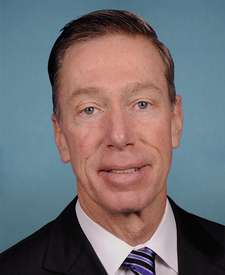
Stephen Lynch (D)
MassachusettsDistrict 8 RepresentativeOffice:
2109 Rayburn House Office Building Washington DC 20515-2108
Memberships:
- House Committee on Financial Services
- House Committee on Oversight and Government Reform
Terms:
- 2025 to 2027 - MA District 8 Representative
- 2023 to 2025 - MA District 8 Representative
- 2021 to 2023 - MA District 8 Representative
- 2019 to 2021 - MA District 8 Representative
- 2017 to 2019 - MA District 8 Representative
- 2015 to 2017 - MA District 8 Representative
- 2013 to 2015 - MA District 8 Representative
- 2011 to 2013 - MA District 9 Representative
- 2009 to 2011 - MA District 9 Representative
- 2007 to 2009 - MA District 9 Representative
- 2005 to 2007 - MA District 9 Representative
- 2003 to 2005 - MA District 9 Representative
- 2001 to 2003 - MA District 9 Representative
Add An Item To Stephen Lynch's Record
Stephen Lynch's Record on Bitcoin, Cryptocurrencies, and Blockchain
- 7/18/2025, 2:30:36 PM
Negative. +1
Representative Lynch Tweeted or was mentioned:
Click for Tweet Screenshot In Case of Deletion or Edits
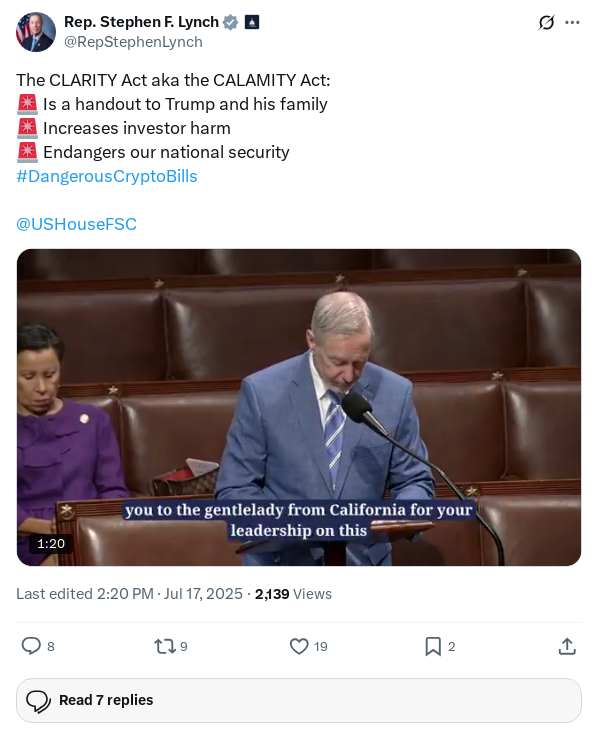 Reference LinkSubmitted By: Anonymous
Reference LinkSubmitted By: Anonymous - 7/18/2025, 2:30:29 PM
Negative. +1
Representative Lynch Tweeted or was mentioned:
Click for Tweet Screenshot In Case of Deletion or Edits
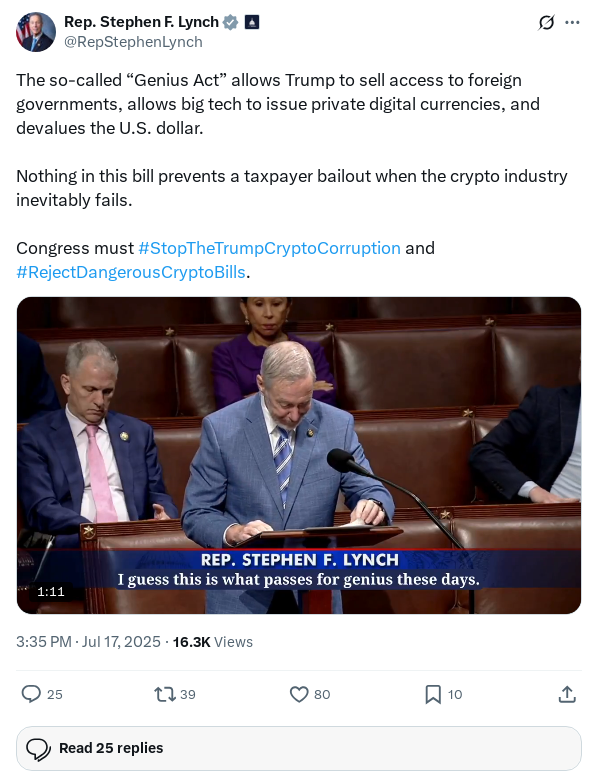 Reference LinkSubmitted By: Anonymous
Reference LinkSubmitted By: Anonymous - 7/17/2025, 10:01:37 PM
Negative. +1
17-Jul-2025: Stephen Lynch voted AGAINST H R 3633 H R 3633 Title: CLARITY Act
Reference LinkSubmitted By: ElectBitcoin.org Congressional Vote History - 7/17/2025, 10:01:26 PM
Negative. +1
17-Jul-2025: Stephen Lynch voted AGAINST S 1582 S 1582 Title: GENIUS Act
Reference LinkSubmitted By: ElectBitcoin.org Congressional Vote History - 7/17/2025, 4:58:46 PM
Negative. +1
16-Jul-2025: Stephen Lynch voted AGAINST H RES 580 H RES 580 Title: Providing for consideration of the bills (H.R. 4016) Department of Defense Appropriations Act, 2026; (H.R. 3633) CLARITY Act; (H.R. 1919) Anti-CBDC Surveillance State Act; and (S. 1582) GENIUS Act
Reference LinkSubmitted By: ElectBitcoin.org Congressional Vote History - 7/17/2025, 4:51:13 PM
Negative. +1
16-Jul-2025: Stephen Lynch voted AGAINST H RES 580 H RES 580 Title: Providing for consideration of the bills (H.R. 4016) Department of Defense Appropriations Act, 2026; (H.R. 3633) CLARITY Act; (H.R. 1919) Anti-CBDC Surveillance State Act; and (S. 1582) GENIUS Act
Reference LinkSubmitted By: ElectBitcoin.org Congressional Vote History - 7/17/2025, 6:55:58 AM
Negative. +1
Representative Lynch Tweeted or was mentioned:
Click for Tweet Screenshot In Case of Deletion or Edits
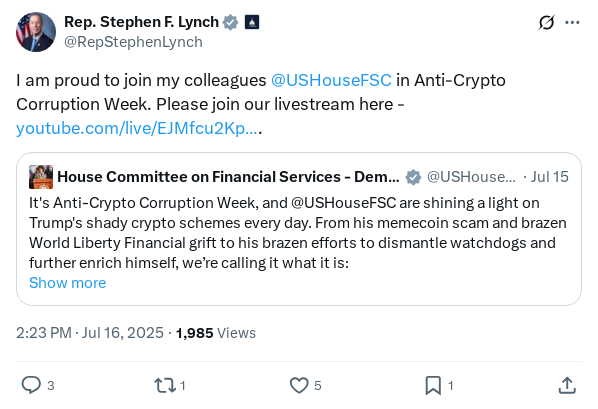 Reference LinkSubmitted By: Anonymous
Reference LinkSubmitted By: Anonymous - 7/16/2025, 7:49:59 PM
Negative. +1
15-Jul-2025: Stephen Lynch voted AGAINST H RES 580 H RES 580 Title: Providing for consideration of the bills (H.R. 4016) Department of Defense Appropriations Act, 2026; (H.R. 3633) CLARITY Act; (H.R. 1919) Anti-CBDC Surveillance State Act; and (S. 1582) GENIUS Act
Reference LinkSubmitted By: ElectBitcoin.org Congressional Vote History - 7/16/2025, 7:36:52 PM
Negative. +1
15-Jul-2025: Stephen Lynch voted AGAINST H RES 580 H RES 580 Title: Providing for consideration of the bills (H.R. 4016) Department of Defense Appropriations Act, 2026; (H.R. 3633) CLARITY Act; (H.R. 1919) Anti-CBDC Surveillance State Act; and (S. 1582) GENIUS Act
Reference LinkSubmitted By: ElectBitcoin.org Congressional Vote History - 7/15/2025, 2:47:15 PM
Negative. +1
Congresswoman Maxine Waters (D-CA), the top Democrat on the House Financial Services Committee, and Ranking Member of the Subcommittee on Digital Assets, Congressman Stephen Lynch (D-MA), announced that next week will be \u201cAnti-Crypto Corruption Week\u201d during which they will lead Democrats in opposition to Republicans\u2019 efforts to jam through the House three dangerous pieces of crypto legislation, including the so-called \u201cCLARITY Act,\u201d the \u201cGENIUS Act,\u201d and a bill banning a central bank digital currency.
Reference LinkSubmitted By: Anonymous - 6/10/2025, 6:53:21 AM
Negative. +1
Representative Lynch Tweeted or was mentioned:
Click for Tweet Screenshot In Case of Deletion or Edits
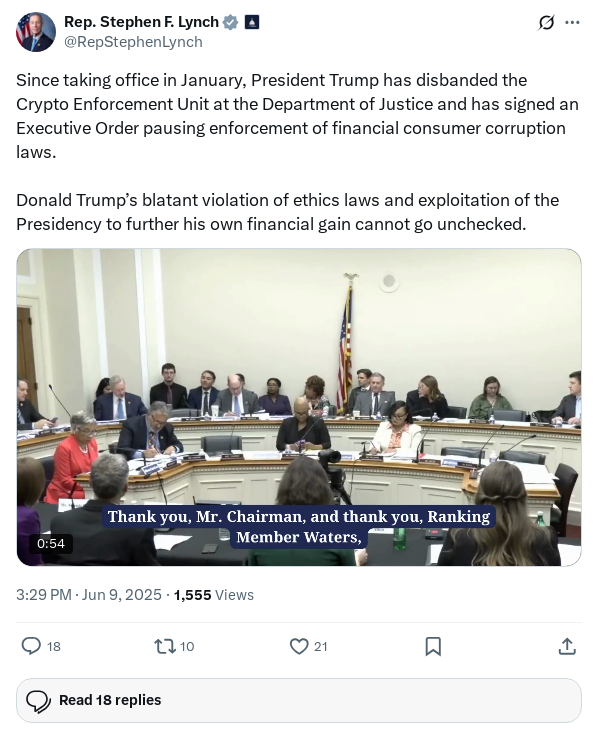 Reference LinkSubmitted By: Anonymous
Reference LinkSubmitted By: Anonymous - 4/14/2025, 6:51:20 PM
Negative. +1
Representative Lynch Tweeted or was mentioned:
Click for Tweet Screenshot In Case of Deletion or Edits
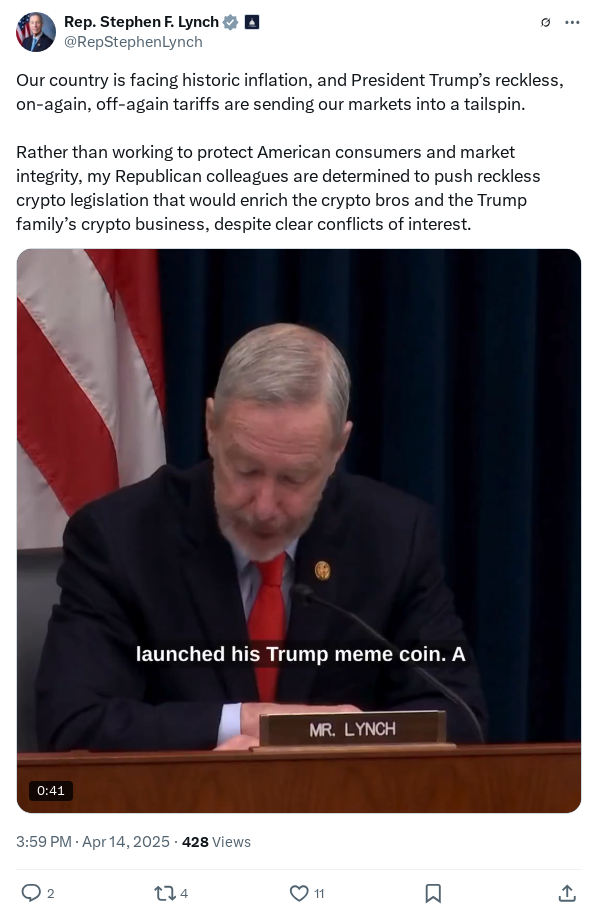 Reference LinkSubmitted By: Anonymous
Reference LinkSubmitted By: Anonymous - 4/3/2025, 6:54:58 AM
Negative. +1
Representative Lynch Tweeted or was mentioned:
Click for Tweet Screenshot In Case of Deletion or Edits
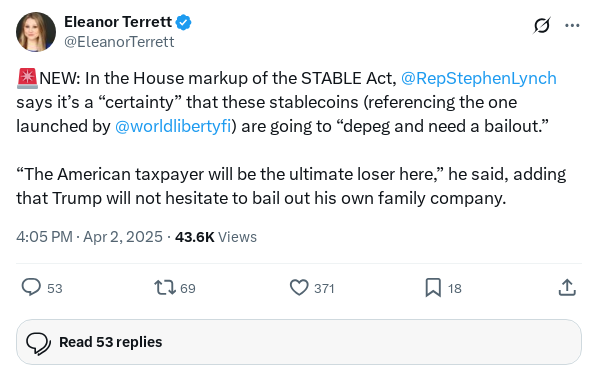 Reference LinkSubmitted By: Anonymous
Reference LinkSubmitted By: Anonymous - 3/12/2025, 7:10:34 PM
Negative. +1
11-Mar-2025: Stephen Lynch voted AGAINST H J RES 25 H J RES 25 Title: Providing for congressional disapproval under chapter 8 of title 5, United States Code, of the rule submitted by the Internal Revenue Service relating to “Gross Proceeds Reporting by Brokers That Regularly Provide Services Effectuating Digital Asset Sales”
Reference LinkSubmitted By: ElectBitcoin.org Congressional Vote History - 3/12/2025, 6:52:38 AM
Negative. +1
Representative Lynch Tweeted or was mentioned:
Click for Tweet Screenshot In Case of Deletion or Edits
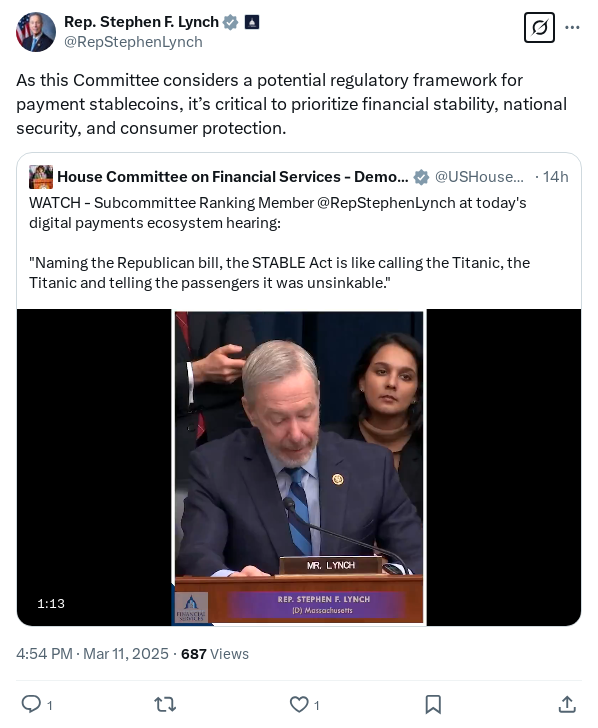 Reference LinkSubmitted By: Anonymous
Reference LinkSubmitted By: Anonymous - 3/8/2025, 6:49:09 AM
Negative. +1
Representative Lynch Tweeted or was mentioned:
Click for Tweet Screenshot In Case of Deletion or Edits
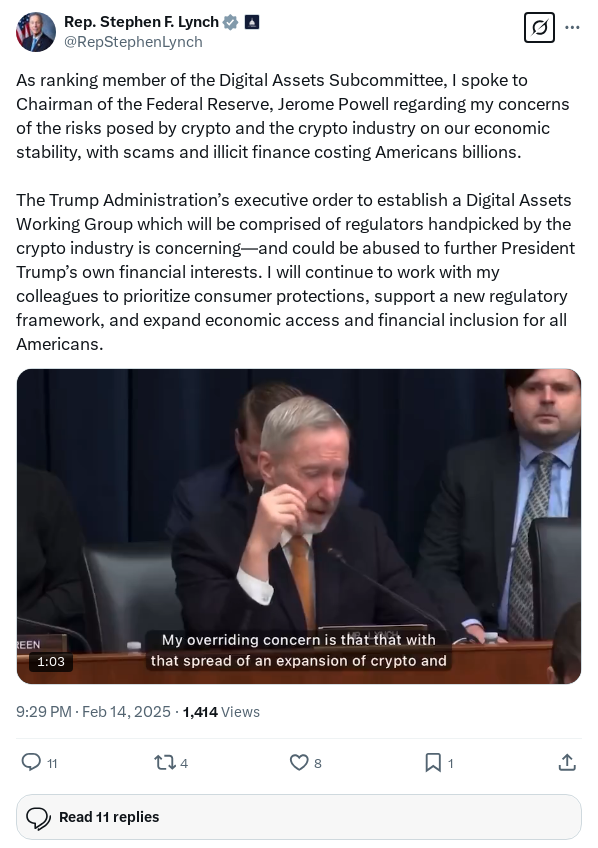 Reference LinkSubmitted By: Anonymous
Reference LinkSubmitted By: Anonymous - 3/8/2025, 6:49:02 AM
Negative. +1
Representative Lynch Tweeted or was mentioned:
Click for Tweet Screenshot In Case of Deletion or Edits
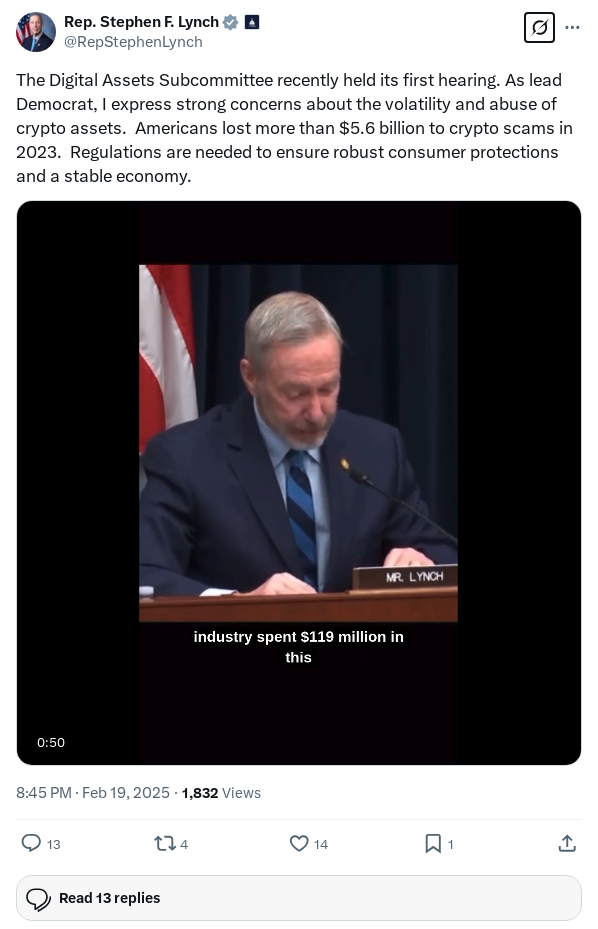 Reference LinkSubmitted By: Anonymous
Reference LinkSubmitted By: Anonymous - 7/11/2024, 4:29:18 PM
Negative. +1
11-Jul-2024: Stephen Lynch voted AGAINST H J RES 109 H J RES 109 Title: Providing for congressional disapproval under chapter 8 of title 5, United States Code, of the rule submitted by the Securities and Exchange Commission relating to “Staff Accounting Bulletin No. 121”
Reference LinkSubmitted By: ElectBitcoin.org Congressional Vote History - 5/24/2024, 12:29:48 AM
Negative. +1
Representative Lynch Tweeted or was mentioned:
Click for Tweet Screenshot In Case of Deletion or Edits
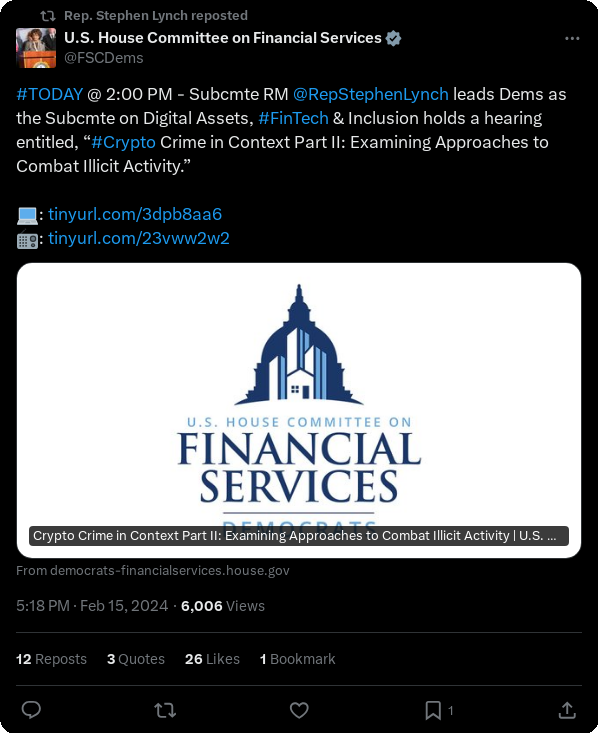 Reference LinkSubmitted By: Anonymous
Reference LinkSubmitted By: Anonymous - 5/24/2024, 12:28:41 AM
Negative. +1
Representative Lynch Tweeted or was mentioned:
Click for Tweet Screenshot In Case of Deletion or Edits
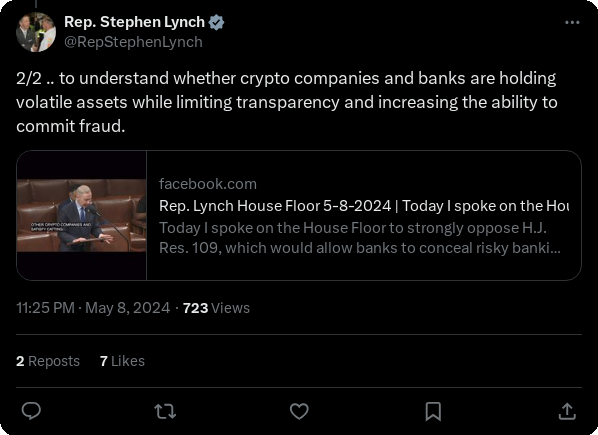 Reference LinkSubmitted By: Anonymous
Reference LinkSubmitted By: Anonymous - 5/23/2024, 2:41:13 PM
Negative. +1
22-May-2024: Stephen Lynch voted AGAINST H R 4763 H R 4763 Title: Financial Innovation and Technology for the 21st Century Act
Reference LinkSubmitted By: ElectBitcoin.org Congressional Vote History - 5/16/2024, 9:33:26 PM
Negative. +1
8-May-2024: Stephen Lynch voted AGAINST H J RES 109 H J RES 109 Title: Providing for congressional disapproval under chapter 8 of title 5, United States Code, of the rule submitted by the Securities and Exchange Commission relating to “Staff Accounting Bulletin No. 121”
Reference LinkSubmitted By: ElectBitcoin.org Congressional Vote History - 10/28/2023, 11:03:36 AM
Negative. +1
Representative Lynch Tweeted or was mentioned:
Click for Tweet Screenshot In Case of Deletion or Edits
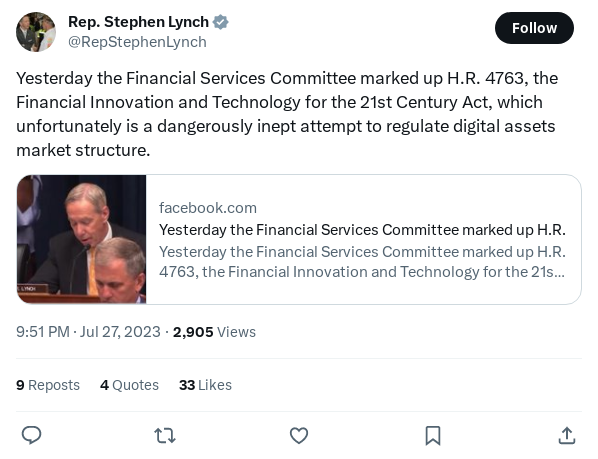 Reference LinkSubmitted By: Anonymous
Reference LinkSubmitted By: Anonymous - 6/24/2023, 1:52:53 AM
Positive. +1
Representative Lynch Tweeted or was mentioned:
Click for Tweet Screenshot In Case of Deletion or Edits
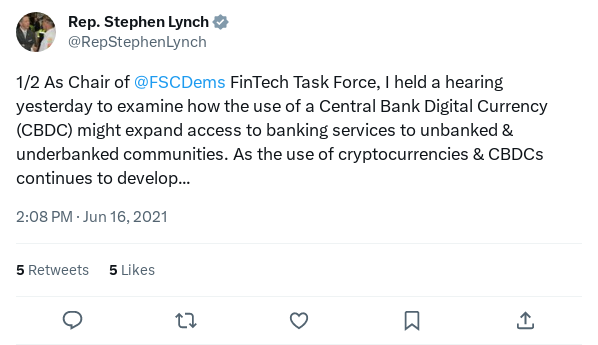 Reference LinkSubmitted By: Anonymous
Reference LinkSubmitted By: Anonymous - 6/7/2023, 5:52:29 PM
Negative. +1
Rep Sherman and Rep Lynch sign a letter to the IRS and Treasury urging the release of cryptocurrency tax regulations. "For many years, the cryptocurrency industry has been a major source of tax evasion and a significant part of the nation's tax gap," the letter claims, without evidence.
Reference LinkSubmitted By: Anonymous